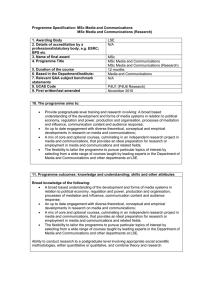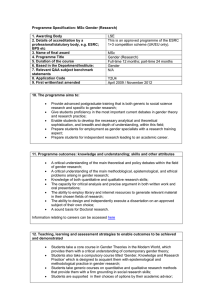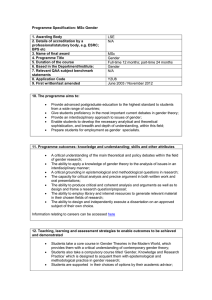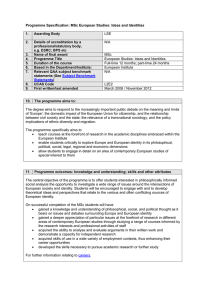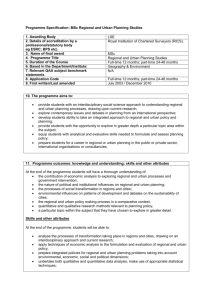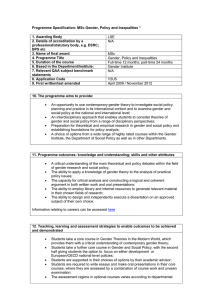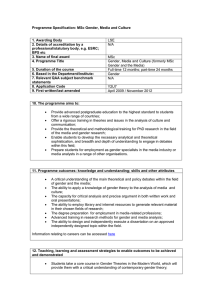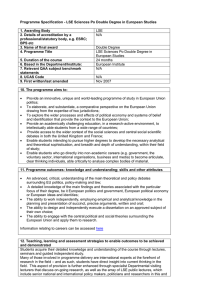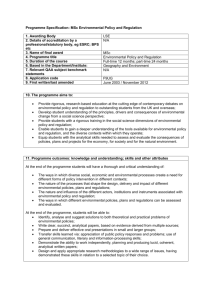Programme Specification: MSc Media and Communications (Media and Communication Governance)
advertisement
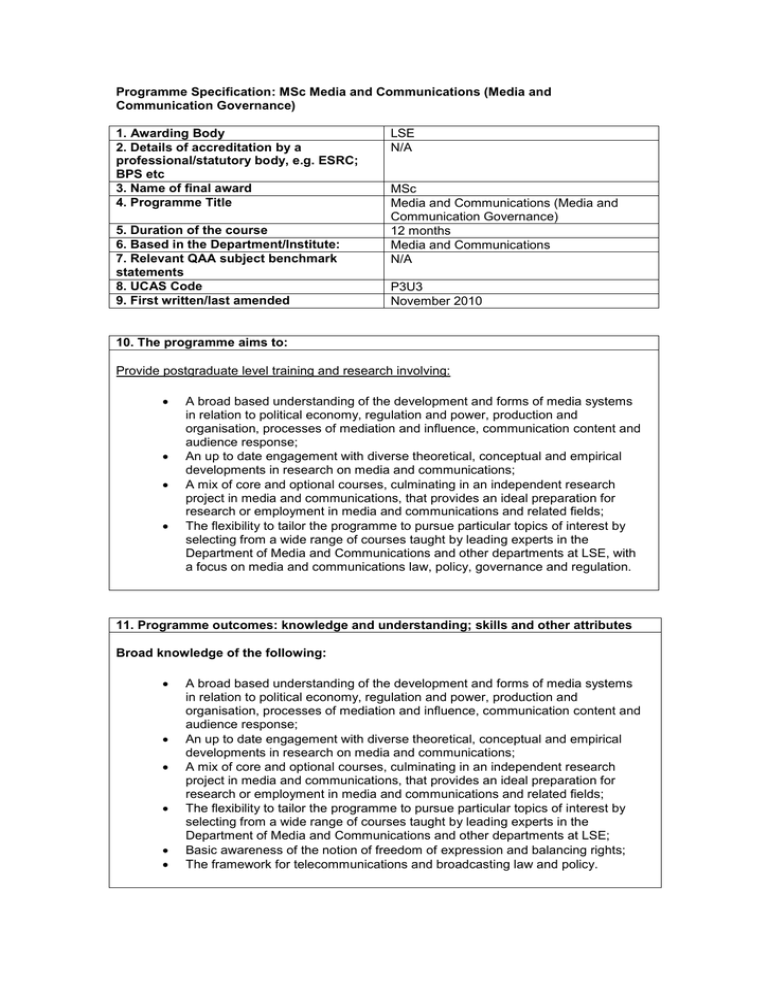
Programme Specification: MSc Media and Communications (Media and Communication Governance) 1. Awarding Body 2. Details of accreditation by a professional/statutory body, e.g. ESRC; BPS etc 3. Name of final award 4. Programme Title 5. Duration of the course 6. Based in the Department/Institute: 7. Relevant QAA subject benchmark statements 8. UCAS Code 9. First written/last amended LSE N/A MSc Media and Communications (Media and Communication Governance) 12 months Media and Communications N/A P3U3 November 2010 10. The programme aims to: Provide postgraduate level training and research involving: A broad based understanding of the development and forms of media systems in relation to political economy, regulation and power, production and organisation, processes of mediation and influence, communication content and audience response; An up to date engagement with diverse theoretical, conceptual and empirical developments in research on media and communications; A mix of core and optional courses, culminating in an independent research project in media and communications, that provides an ideal preparation for research or employment in media and communications and related fields; The flexibility to tailor the programme to pursue particular topics of interest by selecting from a wide range of courses taught by leading experts in the Department of Media and Communications and other departments at LSE, with a focus on media and communications law, policy, governance and regulation. 11. Programme outcomes: knowledge and understanding; skills and other attributes Broad knowledge of the following: A broad based understanding of the development and forms of media systems in relation to political economy, regulation and power, production and organisation, processes of mediation and influence, communication content and audience response; An up to date engagement with diverse theoretical, conceptual and empirical developments in research on media and communications; A mix of core and optional courses, culminating in an independent research project in media and communications, that provides an ideal preparation for research or employment in media and communications and related fields; The flexibility to tailor the programme to pursue particular topics of interest by selecting from a wide range of courses taught by leading experts in the Department of Media and Communications and other departments at LSE; Basic awareness of the notion of freedom of expression and balancing rights; The framework for telecommunications and broadcasting law and policy. 12. Teaching, learning and assessment strategies to enable outcomes to be achieved and demonstrated Teaching and learning strategies: To enable students to develop an understanding of a range of theoretical and methodological approaches to the study of media and communications; To provide students with access to knowledge of conceptual developments and debates in the related fields of research; To provide students with a foundation of relevant skills (qualitative, quantitative empirical and theoretical); To allow flexibility for students to pursue in class and independent research on particular topics of interest in their field of studies; To combine diverse teaching and learning methods that include lectures, seminars and workshops in order to maximize analytical thinking, as well as to advance transferable skills; Formal teaching takes place in Michaelmas and Lent Term. Examinations for all courses are generally held during May and June. Dissertations are completed during the summer months. Assessment strategies: Students are assessed by essays, written examinations and the dissertation which must be submitted at the end of the academic year. Students are expected to submit formative essays in both Michaelmas and Lent Term for which they receive detailed feedback. 13. Programme structures and requirements, levels, modules and awards See the MSc Media and Communications (Media and Communication Governance) programme regulations. Additional information 14. Criteria for admission to the programme Students will need to have at least an upper second class honours degree or its equivalent in social sciences. Applications are particularly welcome from those with professional experience in the media or communications field. 15. Indicators of quality High and strict entrance requirements (see 14) Research quality: The department demonstrated its excellent research quality in the 2008 RAE, being rated third in the country on grade point average. Members of the Department are authors of key texts in their areas of expertise and enjoy international reputation. External Examiners’ reports for programmes reaffirm the excellent quality of teaching in the department. The Department is one of the pioneering programmes to use online teaching and learning resources. 16. Methods for evaluating and improving the quality and standard of teaching and learning School survey of teaching quality; Department survey of graduates; Teaching Committee meetings at least once a term; Annual departmental programme review reports; Annual departmental course review reports; Peer to peer teaching reviews; All members of staff are assigned a mentor; Staff Student Liaison Committee termly meetings; Review and promotion process includes an assessment of teaching; Academic advisers monitor student progress; External Examiners’ Reports. School quality assurance processes include: regular staff appraisal and review; improvements in teaching technique are affected by the Teaching and Learning Centre (TLC) through observations, advice and further training; induction programme and mentoring scheme for new members of staff; Staff/student liaison committee; centrally administered student satisfaction questionnaires by the Teaching Quality Assurance and Review Office; an improved system for ensuring that External Examiner’s comments/recommendations are fed through to Departments and acted upon; the School’s Teaching, Learning and Assessment Committee (TLAC) which regulates all aspects of teaching quality; annual monitoring of courses and periodic reviews every 3-5 years. The outcomes of the annual reviews are presented to TLAC; the School’s Undergraduate Studies Sub Committee and Graduate Studies Sub Committee which oversee all taught programmes and ensure that significant changes to programmes and courses pass through a sequence of formal stages to ensure that curricular changes are appropriate and compatible with other developments.
